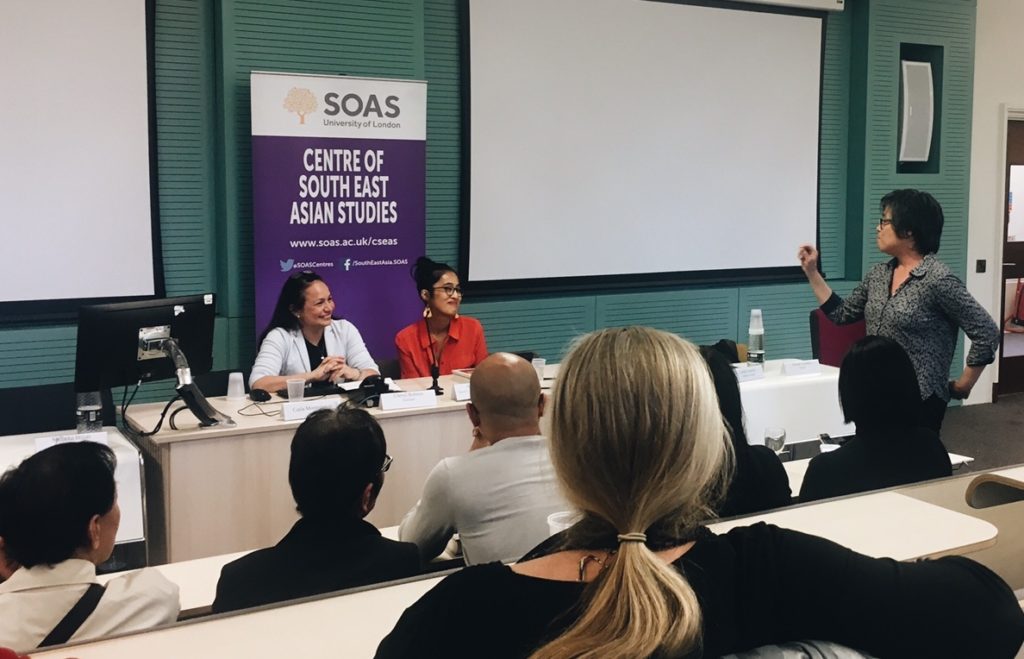‘America is Not the Heart’ author speaks in London
LONDON – Southeast Asian writers, as well as UK publishers and academics, gathered Friday May 4 to celebrate the debut novel, America is Not the Heart, by Filipino American writer Elaine Castillo, and discuss the nature of South East Asian writing from a cross-cultural perspective.
The panel at the Paul Webley Wing (Senate House) was organized by SOAS University.
Author Elaine Castillo, of Ilocano-Pangasinan heritage and raised in the multicultural San Francisco Bay Area, prefaced her reading by expressing her delight at returning to London, where she previously lived for almost eight years during her master’s degree studies at Goldsmiths University.
“It’s surreal to be back,” said Castillo. “Truly, what a pleasure and privilege to celebrate this book with you, especially when it was written here [in London].”
Following her reading, Castillo explained the backstory of the novel’s quirky title.
“The title wasn’t the result of some grand, textual ambition. Being Filipino, I love a pun,” joked Castillo, referring to her deliberate titular inversion of Filipino American writer Carlos Bulosan’s 1946 semi-autobiographical novel, America Is in The Heart.
Not wealthy Manileños
“It was the first time I’d read about abject rural poverty [in the Philippines], rather than about wealthy Manileños.”

Dr. Cristina Juan and Writer Elaine Castillo with writer Candy Gourlay at SOAS University in London. INQUIRER/Melissa Alcantara
“Notions of countries kept in our hearts are there to be contended with,” Castillo explained. This title pushes back at that idea, especially for those in society who are overlooked. “The heart lies [not in America] but in these tiny fragments of the marginalized in small communities.”
An audience member attempted to draw a tenuous link to Spain in Our Hearts, a Spanish civil war novel, which Castillo nixed: “Spain in My Heart – that’s a phrase that will never come out of my mouth unless I’m quoting another person!”
Castillo’s novel is dotted with Filipino phrases and dialects which have no direct translation, and she intentionally left out any explanations or glossary. She explained that this was because, throughout her life, both in the family home (where Pangasinan and Ilocano were freely spoken) and in her wider Bay Area community, “the borders between language were extremely porous.”
“Some minority writers feel that they have to flatten their realities for the West[ern palate],” said the author. “I tried to be faithful to linguistic landscapes, and I did not want to assume the primacy of the reader as white, or [dilute the language] for the comfort of non-Filipino readers.”
No flattening of nuances
Similarly, Castillo notes, she didn’t want to further flatten the nuances that abound in marginalized society, such as the class hierarchy within Philippine culture itself – something that she only recognized in adulthood.
“As a bi[sexual] woman and bi woman of color, it’s important to write about queer immigrant women. Especially suburban women. It’s not the Western trajectory of coming out – rather, it’s about the fullness of their lives.”
“There is a regional, and deep class chauvinism in America which I only noticed as I got older.”
In terms of her identity, however, Castillo views her colorful culture as something she is satisfied with and that something diasporic generations should embrace.
“Diaspora kids experience this ‘stuck between two cultures’ [mindset] – I resist that idea, that I’m incomplete or incoherent. Filipino American is the space I occupy.”
She added: “Sometimes I feel very Filipina. In London [by contrast], I feel very American. Diasporic kids don’t have to make a perfect whole – it’s OK to be in that mixed-up place.”
Writing the diaspora
Following Castillo’s Q&A, a second panel discussion about the experience of writing from a diasporic identity took place.
Moderated by Filipina children’s’ writer Candy Gourlay, the speakers included Castillo, Nathaniel Go (writer), Dr. Mulaika Hijjas (SOAS professor), Gina Consing McAdam (writer), Carla Montemayor (writer), Nicole Lee (writer), Emma Paterson (literary agent), RJ Fernandez (publisher), and Cheryl Robson (publisher).
“Diaspora means a lot of different things,” said Gourlay. “For me, I’ve always searched for truth in my books. The truth is missing – [because] it’s been written by our colonizers.”
Following Gourlay’s statement, SOAS lecturer Dr Mulaika Hijjas said that she feels this colonial tension even during the courses she teaches in South East Asian Studies.
“This colonial perspective is [all-encompassing] and even clouds the SOAS course I teach. I always say that we need to decolonize the curriculum, and read the original Malay [or other] language. Although nobody knows how to read or speak the original languages.”
Marginalized
Cheryl Robson, publisher and writer, added to the conversation by referencing her own work with British East Asian screenwriters: “British East Asians are so marginalized, whereas South East Asians aren’t minorities in their own countries. During the workshops, [it dawned on] South East Asian writers who never realized that their Western counterparts are minorities. But the multiple identities can enrich you.”
Gourlay brought up the notion of food as being an integral part of South East Asian identity, which culinary author Gina Consing McAdam summed up in a single sentence – “We are what we eat.”
Journalist and writer Carla Montemayor expanded on this idea, saying: “Where we come from and how we adapt, it’s all manifested through food. From social aspects of family and sharing, to having experienced hunger and scarcity – food is such a rich mine for those who write the diaspora.”
As the panel drew to an end, Castillo gave one final tip to all aspiring writers in the room: “Firm reminder to not be ‘palatable’ to some ultimately ‘white’ reader – write your urgency and people will respond. Our fiction and art are commensurate to the realities we’re living.”
Gourlay added: “We just have to have faith in our stories.”


